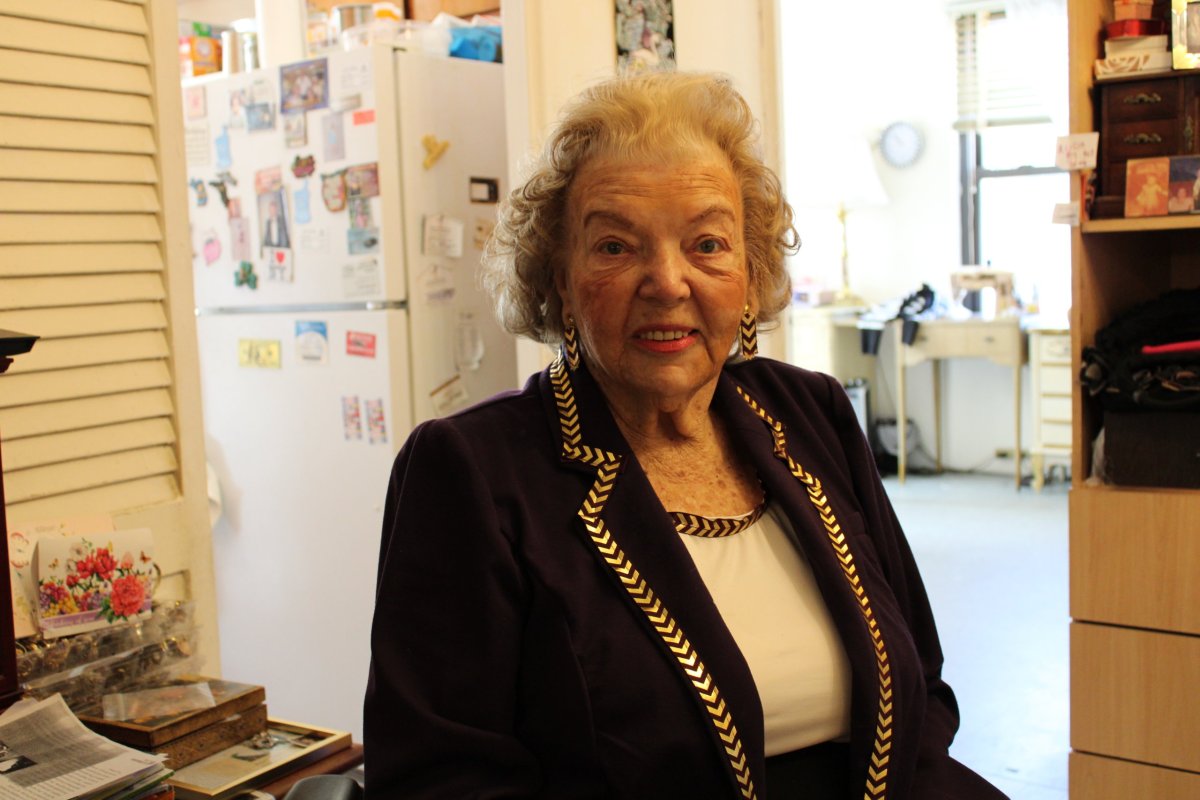When the COVID-19 pandemic started, 91-year-old Holocaust survivor and motivational speaker Lena Goren, a Rego Park resident, remembers feeling hopeless.
“It started bad, very bad, for the simple reason that I am the person that has to go out every day to mingle and talk to people and be outdoors. The wall closes in on me about 4 o’clock if I don’t do something to entertain me or amuse me or others. So, people are my life,” Goren said. “Without people, without places and things to do, I get very very unhappy and bored and [the pandemic] affected me greatly and emotionally. It broke me down, very badly.”
While the beginning of the pandemic marked a difficult time for Goren, she soon had a change of heart.
“Finally, nine months later, I’ve decided there is nothing I could do to change what is. You know the expression, ‘God gave me the serenity to accept the things I cannot change.’ And I’ve decided that eventually [the pandemic] is going to be over and I better live long enough to enjoy it,” Goren told QNS. “So I’ve decided this is it, every day is getting closer and closer to things being better. Everything will open up, the senior centers will open up and I will be able to speak to people.”
Goren is now fully vaccinated and says she feels blessed that she had no side effects. She is also glad to be out and about once again.
“I’m thinking positive. I’m not as depressed as I was. I’m not depressed anymore. I’m not anxious anymore,” Goren said. “I’m going to move through life the best way I know how and keep going. Live while you can. Live while you’re living.”
Goren was born in Salonika, Greece, in 1930. Her family moved to Larissa, Greece, where her father became a Chief Rabbi.
Goren was just 10 years old when World War II started. Many of her family members in Salonika were deported and there was growing fear that the Germans would occupy Larissa next.
Goren’s family left Larissa many times to hide.
“The week of Passover 1941, we spent in a stable,” Goren said. “Over the course of a year we hid in many different places, far from our homes, but always believing we would come back to Larissa when the emergency was over.”
Their fears became much more real on Dec. 21, 1941, when German planes came to Larissa. Goren, her sister and a friend were playing in the streets and assumed that the planes were Greek until they released multiple bombs. The three survived the attack — but many did not.
Goren’s family stayed in bomb shelters frequently, which Goren said felt almost like a second home.
In March 1943, the mayor of Larissa warned Goren’s father that there would be imminent deportation of the Jews in Larissa to concentration camps. Her father was able to spread the word to 15 families (80 people total). Goren’s family, along with the 83 others, fled after curfew to the mountains of Tzouma, where they hid in an isolated monastery away from the war for 18 months. Goren’s family and the 80 others occupied one barnlike room in part of the monastery.
“They (the Underground) asked the monks to move. They moved and we stayed there,” Goren said. “One room. 80 people. No bathrooms, no showers, no kitchen, no beds, no nothing. Just one room.”
During their period of hiding, Goren’s father continued to lead families in Sabbath and holiday services using the Sefer Torah he brought along with him before leaving Larissa.
“He made sure, every night, when we said our prayers every night, he used to say ‘God is merciful, he will save us,’ and that instilled in us that every moment of the day and the night we were safe because of his faith to God and he is going to give it to us.”
Meanwhile, her mother picked up a job as a seamstress in a nearby town, risking her life to help feed her family.
People in the monastery in which they hid got Malaria. Luckily though, everyone survived with the help of the medicine brought by the underground.
When the war was over, Goren’s family returned to Larissa, where her father continued to preach in June 1945. Upon their arrival, they discovered her father’s message reached 900 more people, who were able to escape that fateful night in 1943 as well.
“I was too young to appreciate it at the time, but I owe my very life to the mayor whose name I can’t remember… the one who did what was right instead of what was safe,” Goren said. “I owe my life to the members of the underground who got us shelter by evicting monks of their own Greek Orthodox faith. I owe my life to the gentiles who provided medicine… to the ones who employed my mother so she could feed us… and to the ones who kept our secret in spite of the danger of doing so.”
Very soon after coming back to Larissa, her family received a letter from Goren’s aunt asking them all to come to America.
“My father’s family died in concentration camps, except one sister that had come to America prior to the war and she lived in Cincinnati, Ohio. When she heard what was happening in Greece, she inquired to see what part of her family is still alive. She was told unfortunately no one lived,” Goren said. “But she did not give up. She went through channels to find out if anyone was alive and she found out my father was alive by miracle and she sponsored us.”
With the help of her father’s sister, Goren’s aunt spent $3,000 to sponsor Goren’s family journey to America. Goren was 17 years old when she arrived in America, just two weeks shy of her 18th birthday.
“She spent $3,000 to bring us to America and she bought us a house and she got my father a job because you can’t bring someone to America unless they have a place to live and a job,” Goren said.
In the U.S., Goren said she lived the “American Dream.” Goren was an opera singer and an interpreter for the court system in New York. She also worked as a seamstress and hair dresser. She continues to design clothes today and is proud to showcase her outfits.
Goren married twice in her life: first in 1951 and then in 2003, when she was 75 years old. QNS reported on her second chance at love in 2007. In both of her weddings, Goren designed her wedding dresses.
She had three children. Since Goren only had a third-grade education, her youngest daughter encouraged her to obtain a GED. When Goren was 51 years old, she graduated high school, the same year her youngest daughter graduated from college.
She is a former contestant for Miss Senior America and co-leader of The Melodians, an all-senior chorus in Queens.
Goren currently serves as a motivational speaker and frequently speaks on panels as well as at the local senior center to give life lessons and share her experiences about the Holocaust.




































